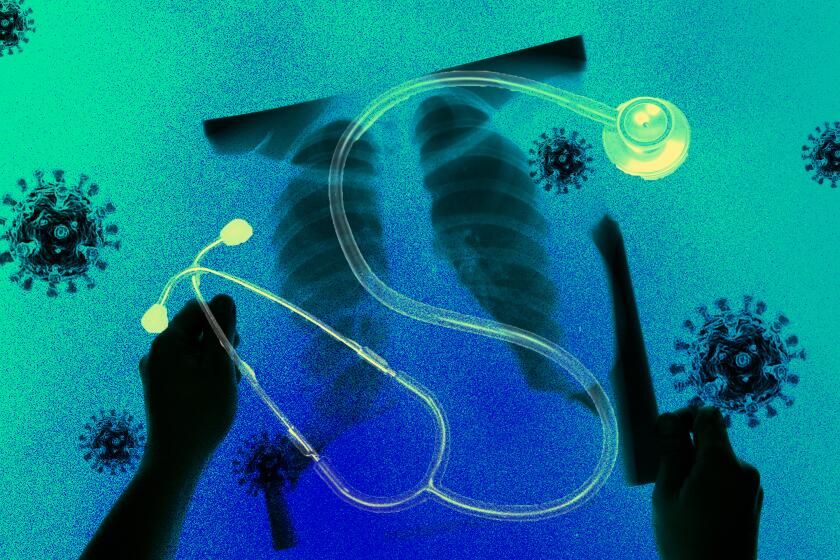Why you should grieve the ‘smaller’ pandemic losses

- Share via
By Laura Newberry
Today we’re talking about the pandemic and acknowledging — really acknowledging — loss. And not just the tragic loss of loved ones, but also the loss that goes unspoken and unrecognized. We’ll explain why doing so is vital to your well-being, and we’ll give you steps you can take to begin the healing process.
Get Group Therapy
Life is stressful. Our weekly mental wellness newsletter can help.
You may occasionally receive promotional content from the Los Angeles Times.
Our experiences of the pandemic have varied widely depending on our age, race, health, class, geography and political orientation. Yet we all have one thing in common: Our lives will never again be like they were before March 2020.
We got a number of questions from readers who wanted to know how we can deal with worldwide grief and how to move forward when COVID-19 is still so prevalent. It got me thinking about how loss has transformed our world.
The loss of loved ones to COVID-19, and the loss of income and financial stability, are easier to name and quantify. Other losses are difficult to wrap our minds around and often go unspoken. The loss of predictability and stability, of our physical workplaces and in-person connection with co-workers, of rubbing elbows with strangers at concerts without fear or guilt, of opportunities and experiences. The loss of our social fabric as we knew it.
I’m very fortunate not to have lost a family member or friend to the virus. I have a stable job and the privilege of working from home. And because of that, I’ve been unsure how to think about the more nebulous losses in my life that were caused or worsened by the pandemic. Two and a half years ago, I had an idea of what my future would look like, and that’s been upended in big and small ways. But surrounded by so much palpable, heavy loss, it can feel as though I have nothing real to grieve.
I know that’s not true — intellectually, at least. There is a whole spectrum of grief, which is the natural response to losing someone or something to which we’re attached. It can range from a dull, intermittent heartache to an all-consuming and unbearable pain. I wanted to really understand how these intangible losses affect us, so I sought out teachers and practitioners who’ve made the study of loss their life’s work.
The L.A. Times wants to hear from long haul COVID-19 patients in California and their caregivers about how they’re navigating the challenges of their illness.
Rewriting our life stories
Robert Neimeyer, a clinical psychologist and director of the Portland Institute for Loss and Transition, told me that the pandemic had shaken the foundation of assumptions about what our lives would be like. “We are left struggling with the consequences,” he said.
“If we are the authors of our books of life, we’re having to tear out the rough drafts of chapters we thought we would be living and rewrite them anew, with different people, places, etcetera,” Neimeyer said. “We are rebuilding a world of meaning that has been challenged by loss.”
Many of us lost our routines and rituals, whether it was graduations, weddings, funerals or entire years of school. We lost confidence in our government. Our social circles shrank, and we lost touch. Relationships fell apart. Some made daily sacrifices, like risking their lives to go to work and provide essential services to others, which haven’t been meaningfully recognized. Black and brown people watched white allyship surge during the 2020 uprisings and then fade to a whisper by 2021.
These are all real losses that have altered the fabric of our lives, and it is natural to grieve them, experts told me. But it’s almost impossible to heal from grief if we don’t bring it out into the open. When we talk about our losses with others, we learn healthy ways to cope and ultimately accept how our lives have changed. We free up energy that is bound up with what we lost. In contrast, when we don’t address our losses, we struggle to reinvest that energy into moving forward. It can be hard to form new relationships and thrive in those we already have. We turn to alcohol or food or other means of exiling the pain. We become stuck.
“It’s why so many more people right now are anxious, depressed, stressed out,” said Sherry Cormier, a psychologist and certified bereavement trauma specialist.
It’s a culture problem
It’s not our fault that loss has been hard for us to identify. Our dominant Western culture is grief-averse, explained Michelle Williams, co-founder of Being Here, Human, which is a Black- and LGBTQ-led grief literacy and education organization. We don’t talk much about loss, and when we do, it’s usually about death.
“Our culture is so committed to the pull-yourself-up-by-the-bootstraps emotional mentality,” said Marisa Renee Lee, author of “Grief Is Love: Living With Loss.” “If you are angry or sad or grieving, we make it your individual responsibility to get over it and be happy as soon as possible.”
The subtext here is that if we take time to mourn, we’re not being productive. And that’s bad for the economy, Williams said. I was talking about this with a friend, and they noted how most companies afford workers just a few so-called “bereavement days” when they lose an immediate family member (three days are most common, according to the U.S. Bureau of Labor Statistics). And that’s for a loss that’s socially acknowledged.
The pandemic has amplified our culture’s tendency to turn away from loss. We just want the pandemic to be over, so many of us are acting as if it is. “We might be unusually intolerant of displays of grief or lingering bad feelings related to any COVID-related loss,” Neimeyer said. “We’re exhausted.”
So what can we do?
How can we integrate these layers of loss?
- First off, you need to name your losses. One way to do this is to ask yourself, several times, “What have I lost?” and then, “What more have I lost?” Neimeyer recommends creating a list or a timeline. As you progress, the losses will go from more concrete and obvious to subtle and collateral. To ritualize this process, light a candle for each loss, or listen to a song that represents what you’re feeling. Anything to mark the moment. These symbolic gestures help us mourn.
- Talk about your loss with loved ones or a therapist (or both) once you’re ready. Ask your friends about what they’ve lost too. “To give the gift of compassionate attention to our losses, however vaguely sensed, and to those of others through listening more than speaking, can be part of the way forward,” Neimeyer said.
- You can also advocate for memorials and other public spaces to mourn. But in the absence of leaders taking action, you and your community can create your own. Rachelle Bensoussan, co-founder of Being Here, Human, pointed to the memorial and occupied protest at the intersection in Minneapolis where George Floyd was killed by police.
“It’s a tricky thing, because we never want to put the full onus of healing and memorialization on communities that have been most harmed,” said Lee, when I drew a parallel between how we’ve collectively denied pandemic loss and our nation’s stunted and delayed reckoning with slavery and racism. “If you are a part of a community that has been particularly harmed during the pandemic — Black people, poor people of color — we have to do whatever it is we need to mourn and to heal. But that doesn’t take responsibility away from those in power to do something, say something.”
For Bensoussan, continuing to wear a mask in public spaces is her way of acknowledging the loss that has occurred and continues to occur. She compared it to the Jewish tradition of kriah, the act of tearing one’s clothes or cutting a black ribbon worn on one’s clothes as an expression of grief.
Working on this piece has made me realize how important it is for me to speak aloud what I’ve lost, not to disown or minimize it, to validate my experience and those of others. So I’ve started there, in my journal and with friends. I invite you to do the same.
See you here next week,
Laura
If what you learned today from these experts spoke to you or you’d like to tell us about your own experiences, please email us and let us know if it is OK to share your thoughts with the larger Group Therapy community. The email [email protected] gets right to our team.
See previous editions here. To view this newsletter in your browser, click here.
More perspectives & resources on today’s topic
- The pandemic has been hard on mental health. What to do if you can’t afford therapy, from my colleague Jessica Roy.
- Inside the movement to build national and local COVID memorials, started by a San Francisco woman who lost her 65-year-old father to the virus.
- An interview with retired psychotherapist Pauline Boss on “ambiguous loss,” a term she coined. I spoke with her for this piece too. She recently wrote a book on the subject called “The Myth of Closure: Ambiguous Loss in a Time of Pandemic and Change.”
Other interesting stuff
- Creators of mental health content on TikTok and Instagram have become de facto therapists for millions. But those apps aren’t designed to prioritize accurate, helpful information.
- Some Black communities have avoided using psychedelics because of the racialized history of drugs in the U.S. But this group of mothers is bucking that trend and using psilocybin to heal trauma.
- Drought, pests and slim margins threaten the mental health of farmers. To help, five states are piloting a unique hotline.
- I can’t tell whether this “how to change your mood” Instagram reel is a joke, but I love it and have watched it at least 10 times.
Group Therapy is for informational purposes only and is not a substitute for professional mental health advice, diagnosis or treatment. We encourage you to seek the advice of a mental health professional or other qualified health provider with any questions or concerns you may have about your mental health.
Get Group Therapy
Life is stressful. Our weekly mental wellness newsletter can help.
You may occasionally receive promotional content from the Los Angeles Times.





